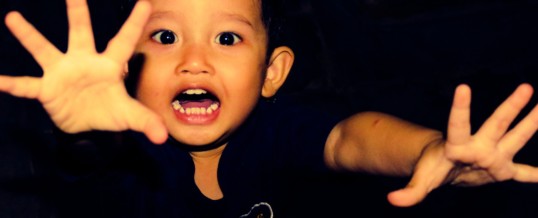
In most circles excitement is a positive word – often considered synonymous with fun.
A movie, a television program, even an activity for young children, is praised for being exciting. Using the common definition, the opposite of exciting is boring, and boring is to be avoided at all costs.
Excitement, however, can also refer to agitation, over-stimulation and loss of control – the opposite of calm.
Parents, observing their over-excited children running around in circles – coming close to knocking over the birthday cake, Christmas tree or each other – exhort them to stop and calm down. These moments are definitely not fun – especially when a child, in addition to the cake or the tree, suffers some damage.
The term fun can also refer to activities that are not necessarily exciting. Reading a book, even a quiet one like Goodnight Moon, for example, can be fun but not exciting. Reading one of those books with all the built-in computerized quacks and sirens, on the other hand, can be exciting but not much fun after the novelty has worn off.
Clarification and perspective
We find that clarification of the difference between fun and excitement can help assess which activities are and aren’t helpful to our children in the process of growing up; which activities bring pleasure and mastery and which activities lead to distress and loss of control.
This clarification seems particularly helpful to address during times of celebration, holidays and birthdays, when the media and family customs tend to promote excitement as if it were fun, when it isn’t always.
Is it really fun to be bombarded with advertisements and floor-to-ceiling rows of toys – the majority of which you are told you can’t have?
Is it really fun to have your home invaded by dozens of children you don’t know very well who want to play with your most precious belongings and eat up all that beautiful cake, including the part with your name on it, and then smash with a stick that lovely piñata your mom bought for you only yesterday?
Is it really fun to put on a costume with a mask you can’t see out of and walk up and down the streets with terrifying-looking creatures who shove you out of the way if you can’t say “trick or treat” fast enough?
Is it really fun to be at a party with 40 other adults and children where so many things are going on that you can’t make sense of anything and you end up racing some other child up and down the stairs over and over until you slip, fall down, and end up with a bleeding lip?
And what if, in the midst of one of these “fun” activities, you lose control in your over-excitement, hit somebody and get yelled at? How much fun is that?
Stimulation and agitation
Excitement is a physical/emotional state that occurs in response to stimulation.
Some call excitement an impulse. It can be pleasurable when the degree of stimulation is manageable. But it stops being fun when the stimulation becomes bigger than a person can manage – that is, when the excited impulse takes over and propels a person into doing something he or she wouldn’t otherwise want to do.
On the adult level, as an example, a person can sincerely regret a sexual escapade, remarking, “I don’t know what came over me – it was just so exciting!” Similarly, a child might say, if he could find the words, “I really didn’t mean to bite him! We were just having fun wrestling and it happened.”
You’ve already learned to spot the signs that your child is getting over-stimulated. His voice raises both in pitch and volume, his eyes narrow and his teeth clench with aggression. Or if he is the victim of some other overexcited child, his eyes widen with fear and approaching tears.
You feel the need to jump in and stop the running, the wrestling, the tickling, before the loud laughter turns to loud sobs.
You can hear your mother’s words from your own childhood coming out of your mouth: “Now, just stop before someone gets hurt!” But part of you may want to squelch that impulse because you don’t want to spoil the “fun.”
Go with your first reaction and stop the escalation of excitement before it takes over and the “fun” ends in Band-Aids or broken table lamps or worse.
Your child may even protest that he and his friends were just playing, that no one will get hurt. But he in fact is not enjoying this scary excitement and will quickly accept a substitute activity that you suggest.
Providing a sense of control
Your child will enjoy holiday and other special celebrations the most when he feels sufficiently in control of his experiences. You can help in this by providing ways to be an active participant in as many parts of the celebration as possible. He can help make the decorations and set the table for the guests. He can be told ahead of time exactly what will happen and when (no surprises) and be allowed to make choices where possible.
You can protect him from becoming over-stimulated by pacing the activities and choosing ones appropriate to his age level.
Have fun having fun together.
NOV
2022


About the Author: